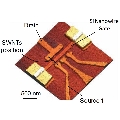Nov 30 2010
Silicon nanowires and carbon nanotubes have been used by French researchers for the manufacture of light- sensitive advanced memory systems.
 Memory Systems
Memory Systems
Due to the miniature and complicated structure of the computer chips, the researchers are aiming at carbon-enabled elements for the fabrication of memory chips. These nano-structured memory systems play a major role in nanoelectronics circuits in the future. In order to enhance the performance, the down-scaling of the programming speed as well as the size are significant.
Carbon nanotubes that been deployed earlier for the manufacture of field-effect transistors (CNTFETs) exhibit high-sensitivity to their environment, and can be utilized as sensors. In a recent publication, Vincent Derycke and his colleagues at Saclay have illustrated that it is possible to design CNTFETs that have the capability to function both as light sensors and memory components.
The devices integrate thin silicon cables as gate electrodes; autonomous carbon nanotubes as a semiconducting material, and a polymer base as a light-sensitive element. The electron-hole pairs have been created in the polymer in respond to light, and by isolating and capturing them the device becomes operative. The gate electrode regulates the charge that has been captured and modifies the memory level.
The operating speed of such systems enhances exponentially when there is a decrease in the thickness of gate oxide. The scientists have employed this system to understand the nanoscale charge-capturing property and scaling rules for gate oxides. According to the scientists, this study will advance the programmable circuits with intense resistance to distortions and variability.